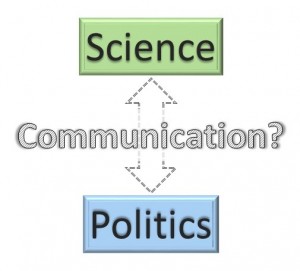By: Maria Qadri
[caption id="attachment_626" align="alignright" width="300"] Can there be effective communication between Science and Politics?[/caption]
Can there be effective communication between Science and Politics?[/caption]
On December 2nd, I snatched a spot at the overbooked “Eagleton Science and Politics Workshop: Advocating for Science - How to Inform and Persuade Politicians” event, which was held in conjunction with iJOBS and several other partners here at Rutgers. The graduate students, faculty members, and citizens filed into a room that was neither an oversized lecture hall nor a cold classroom, but rather the cozy and carpeted drawing room of a historic mansion centered around a single podium. The room buzzed with energy despite the early hour - we were excitedly awaiting the arrival of Rush Holt Jr., the former eight-term U.S. Representative of New Jersey who also happened to be a rocket scientist in his prior life.
Without overly emphasizing his current role as CO of the American Association for the Advancement of Science (AAAS), Rush jumped right into why science communication with the general public and with politicians is of the utmost importance in our day-to-day lives. The main themes of discussion were hallmarks that most modern scientists are well aware of: the erosion of public appreciation for science, the substitution of ideology for evidence, the blurring lines between technology and science, and what we as scientists in training should focus our energies on -- equipping the public with the skills and confidence to deal with evidence. Instead of brushing off questions with the “I’m not a scientist” excuse, the general public should be able to identify credible evidence and explain their reasoning to achieve a particular opinion based on that credible evidence. Unfortunately, some of that overconfidence and diminishing skill results from challenges, constraints, and cutbacks in K-12 science education. HOWEVER! As we progress through our training, we’re given many opportunities to talk to people with varying levels of science understanding. Rush hypothesized that if each of us ensured our immediate families and friends attained those basic evidentiary skills, we as scientists would have a lasting impact on the public’s understanding of issues like climate science, healthcare, and emerging technologies.
The second part of the workshop provided more clarification on the nuts and bolts of science communication. The Director of Government Relations from AAAS, Joanne Padrón Carney, explained the cultural disconnect between how science and politics work: scientists are systematic, open to changing hypotheses and directions based on new evidence, and work in highly specialized fields whereas politicians are reactionary, unilaterally decisive, and work on several broad issues. While being aware of this difference, Joanne emphasized that our goal should be to change the nature of the discussion -- we should not talk TO policymakers but rather talk WITH them. Part of this means adapting our communications styles. We are taught to structure scientific conversations in the following manner: Background -> Hypothesis -> Methods -> Results & Conclusions. However, when speaking with policymakers we deliver our message more effectively if we start with the conclusions, explain why and to whom it matters, and end with the details. She clarified that that our message should be miniature (about a minute), meaningful, and memorable.
Joanne highlighted many ways to impact policy on many different levels: join an advisory board or the government relations board of your favorite scientific society; write an op-ed in the Targum, the Star Ledger, or publication of your choice; build bridges between science and society, maybe even during Rutgers Day; or visit your Congressperson in DC or even while they are at their local office.
Here at Rutgers, we’re lucky to have a wealth of resources about the intersection of science and politics - the Eagleton Institute regularly host speakers throughout the year and will definitely be hosting another workshop in the spring. I would be remiss if I did not mention the Rutgers Chapter of the National Science Policy Group that I lead in conjunction with Eagleton Fellow, Jennifer Therkorn. We are currently devising ways to practice our science communication skills and preparing for our third Congressional visit in April to speak with as many members of the New Jersey Delegation as we can schedule into one day. If you’re interested in getting involved, please check out our Facebook page or email us at rutgersnspg@gmail.com.
If you are looking for a little more information or more concrete tips, check out the following AAAS resources: